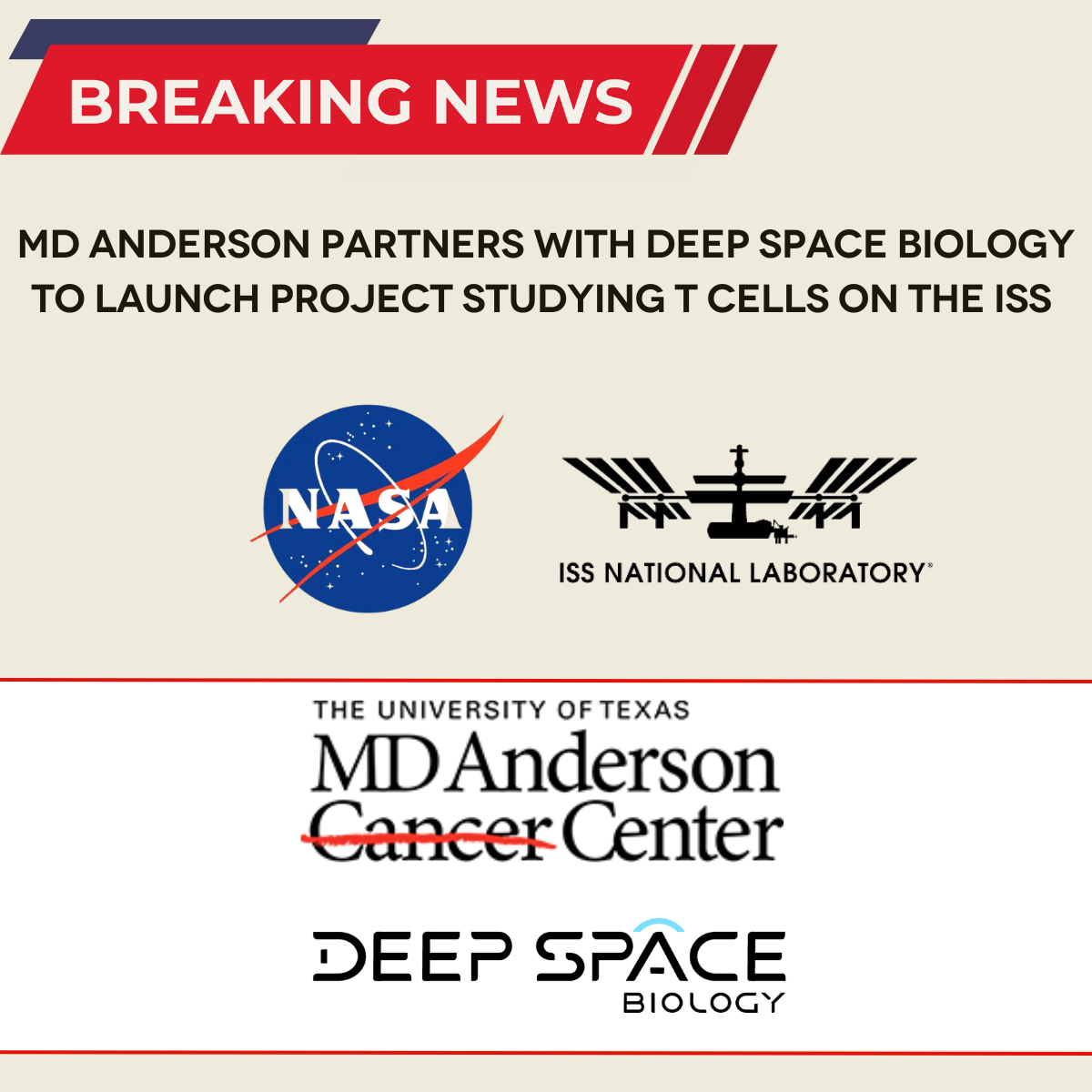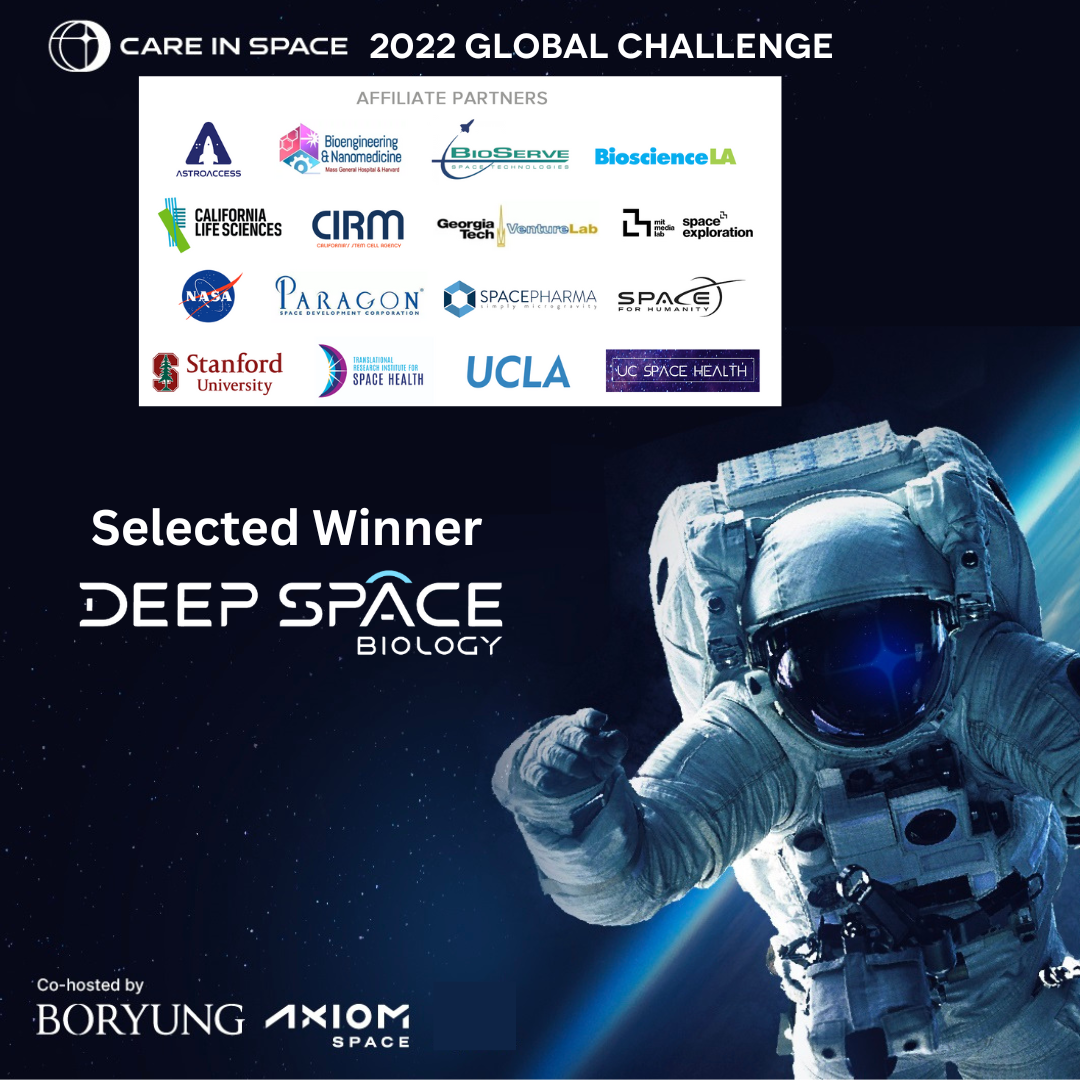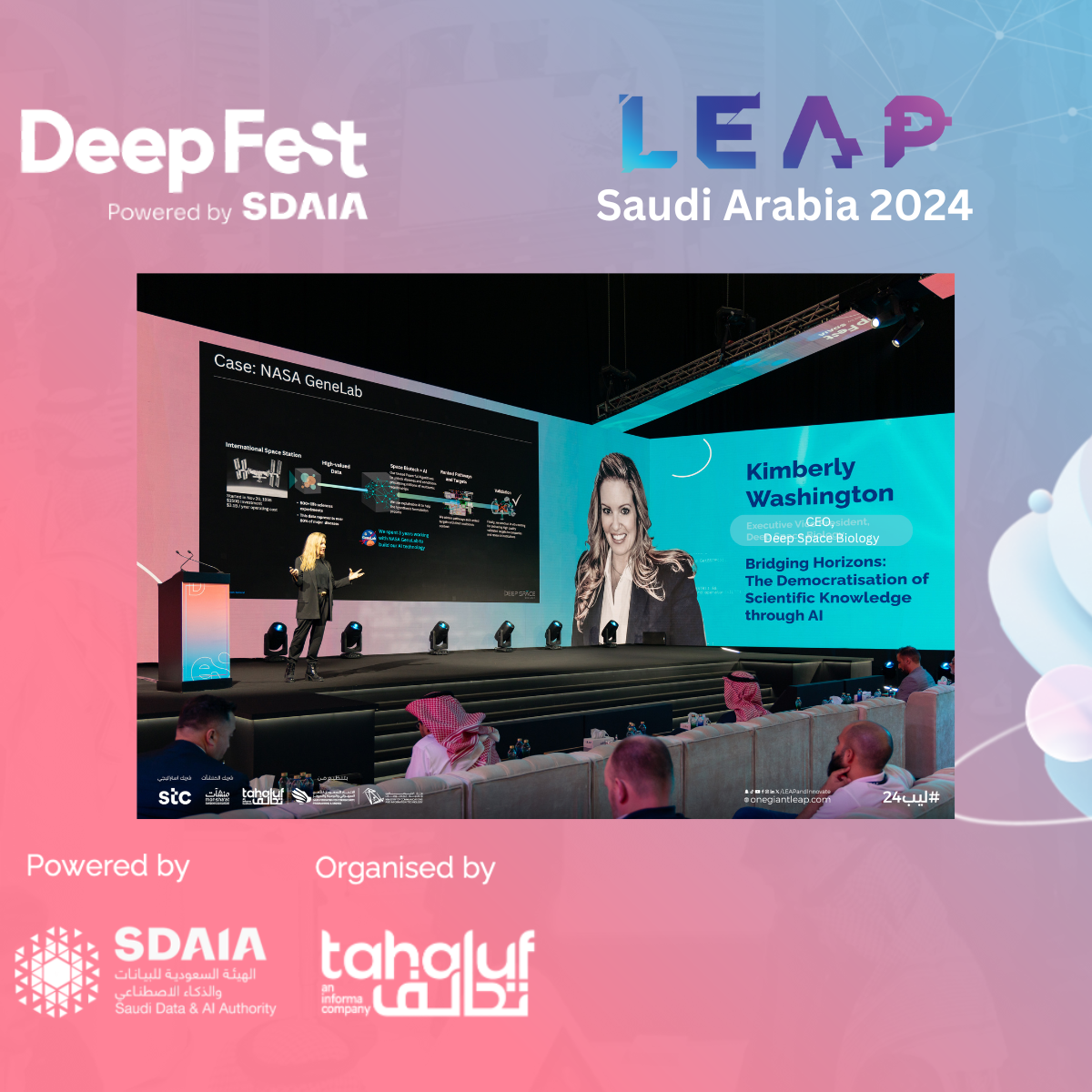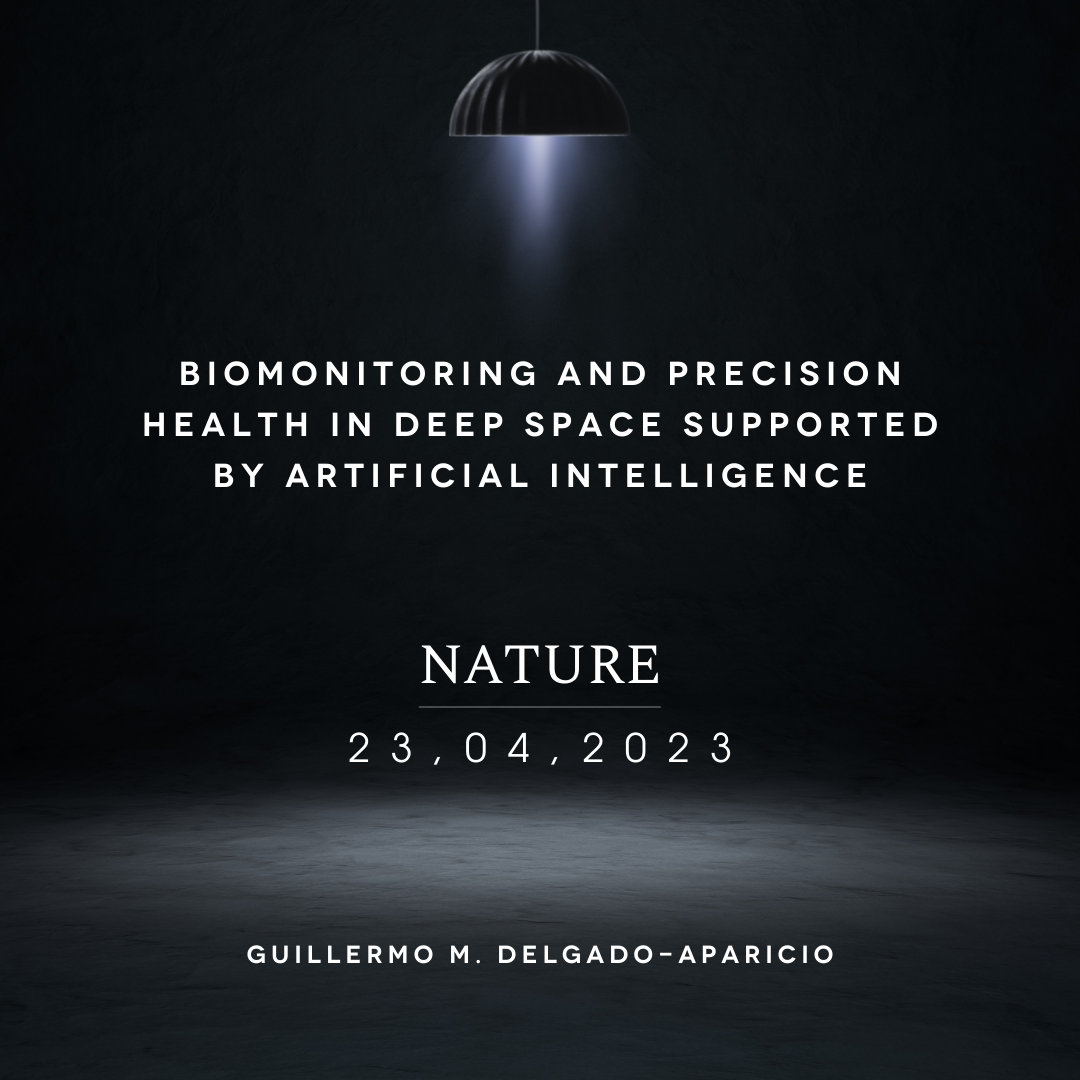-
![]()
Deep Space Biology Selected by md anderson
New ISS research project will benefit cancer patients on Earth. Our collaboration with MD Anderson represents a significant step forward in leveraging space-based research to revolutionize cancer and immunology studies. We're honored to join the team selected for the prestigious NASA "Moonshot Grant".
-
![]()
Deep Space Biology & Farcast Biosciences have partnered to revolutionize Cancer Research with AI & Big Data
We've joined forces in a groundbreaking partnership. By combining our AI platform, Yotta, with Farcast's tumor microdynamics data, we're poised to redefine cancer treatment. This collaboration promises to unveil unprecedented insights into tumor mechanisms and therapeutic targets, paving the way for precision-designed therapies.
-
![]()
Biological research and self-driving labs in deep space supported by artificial intelligence
Space biology research co-authored by Guillermo M. Delgado-Aparicio which aims to understand fundamental spaceflight effects on organisms, develop foundational knowledge to support deep space exploration and, ultimately, bioengineer spacecraft and habitats to stabilize the ecosystem of plants, crops, microbes, animals and humans for sustained multi-planetary life.
-
![]()
Deep Space Biology wins the 2022 Care In Space global challenge
Hosted by Boryung in collaboration with Axiom Space and Starburst Aerospace, the CIS Challenge, where Deep Space Biology emerged as a winner, is designed to propel the future of space health and the next generation of pharmaceutical, bioscience, and medtech development in space. This pioneering program, the first of its kind, is strategically positioned to expedite the development of space health and health-adjacent solutions. The goal is to enhance access to space, address human healthcare-related challenges in space, and innovate healthcare solutions that have applications both in space and on Earth.
-
![]()
NASA GeneLab Success Stories
January 2024-Deep Space Biology was honored to be featured in the NASA Genelab Open Science Data Repository Success Stories podcast. Over three years of collaboration with NASA Genelab, we played a pivotal role in standardizing over two decades' worth of microgravity biological research. Our groundbreaking achievements were realized through the application of Yotta's advanced AI algorithms.
-
![]()
Deep Space Biology selected as Top 20 SpaceTech Startups to watch in 2023.
Startus, the world’s largest resource for data on emerging companies, the SaaS platform enables you to identify relevant technologies and industry trends quickly & exhaustively. Based on the data from the platform, the Top 20 SpaceTech Startup Hubs are in London, New York, Bangalore, San Francisco, and Los Angeles.
-
![]()
The World Economic Forum 4th Industrial Revolution Annual Meeting in Saudi Arabia
Kimberly Washington, CEO of Deep Space Biology, addresses The World Economic Forum in Saudi Arabia, providing insights on the ever-changing space ecosystem.
-
![]()
The Economist Space Economy Summit, Los Angeles, October 2023.
During the inaugural Space Ecconomy Summit, Deep Space Biology launched a coalition for Open Science Roundtable & Open Forum seeking to spark a global movement. During these sessions we highlighted open science's impact on human health breakthroughs, it accelerates frontiers in space exploration and drives advancements in Earth's healthcare. Emphasizing unity across borders and disciplines, open science unites humanity for common causes.
-
![]()
Biomonitoring and precision health in deep space supported by artificial intelligence, a paper recently published in Nature.
Human exploration of deep space will involve missions of substantial distance and duration. To effectively mitigate health hazards, paradigm shifts in astronaut health systems are necessary to enable Earth-independent healthcare, rather than Earth-reliant. This paper showcases the contributions of Guillermo Delgado Aparicio, Chief Operating Officer of Deep Space Biology.
-
![]()
Montana Bilger, Deep Space Biology CTO, featured as one of four individuals shaping the future of AI.
There is no doubt: the Future is here and now. With the rapid innovation and implementation of AI and machine learning across all industries, the future is going to look a lot different over the next few decades. I was able to interview a few entrepreneurs and startup founders who are looking to be a part of this disruption. Here’s a quick look at who they are and what they are doing!
-
![]()
DeepFest LEAP Technology Conference, Saudi Arabia
KEYNOTE Presentation
BRIDGING HORIZONS: THE DEMOCRATIZATION OF SCIENTIFIC KNOWLEDGE THROUGH AI, HEALTH R&D, AND SPACE EXPLORATION FOR SOCIETAL ADVANCEMENT
AI IN HEALTHCARE: DIAGNOSTICS, DRUG DISCOVERY, AND PERSONALIZED PATIENT CARE
-
![]()
Deep Space Biology recognized as one of the world's top 50 innovators
-
![]()
New Worlds, Houston Texas
Along with all we've learned about human health from space, we are learning how to improve human health In space. Several intriguing and important presentations and a discussion about how and who we will be as we open the High Frontier.
Junaid Mian - EarthLight Foundation
Dr. Luis Campos - Historian of Science, Rice University
Kimberly Washington - Co-Founder/CEO Deep Space Biology
Dr. Scott Solomon - Professor of BioSciences, Rice University
-
![]()
Nature Published Paper
Human exploration of deep space will involve missions of substantial distance and duration. To effectively mitigate health hazards, paradigm shifts in astronaut health systems are necessary to enable Earth-independent healthcare, rather than Earth-reliant. Here we present a summary of decadal recommendations from a workshop organized by NASA on artificial intelligence, machine learning and modelling applications that offer key solutions toward these space health challenges.
-
![]()
The Economist Space Summit
Lisbon, Portugal- Kimberly Washington joined a dynamic panel discussion on the transformative potential of microgravity for drug discovery, manufacturing, and tackling complex diseases on Earth.
-
![]()
Space Daily News
Deep Space Biology has partnered with The University of Texas MD Anderson Cancer Center, along with other collaborators to launch a research initiative that will send T cells to the International Space Station (ISS) to investigate the effects of prolonged microgravity on cell differentiation, activation, memory, and exhaustion. Results will be analyzed on Earth to uncover signaling pathways and identify potential immune targets, aiming to enhance treatment strategies for cancer and other diseases.
-
![]()
Deep Space Biology CEO Featured in Space.com
Celebrating Women's History Month with words of wisdom from across the world.
The history of women's contributions to the space industry is significantly shorter than it is for men, simply because women were dealt a delayed start in the race. For example, NASA's astronaut program began in 1959, but it wasn't until 1978 when the agency's lineup of astronaut candidates finally included women. Yet, thanks to many brave trailblazers who pushed against the unfair boundaries of equality in space exploration, the number of leading ladies writing their way into history books has risen rapidly. Decades later, I think it's safe to say that, although we still have more work to do, a lot of great work has been done.
-
![]()
Abu Dhabi Global Healthcare Week, UAE
Through mentorship connections and collaborative opportunities, Kimberly Washington, Deep Space Biology and Dr. Scott Penberthy- Healthcare and Life Sciences CTO, Google Cloud - aim to inspire and nurture young talents who are passionate about driving positive change in the health landscape.
-
![]()
AI For Health, Paris France
This keynote provides an in-depth look at how AI can be leveraged for global health impact by utilizing space microgravity research. It will include an overview of recent discoveries and the potential for AI to revolutionize healthcare delivery and outcomes worldwide. o Key Takeaways: - Key findings from space microgravity research - The role of AI in translating these findings into global healthcare innovations - Strategies for global implementation and medical impact.



















